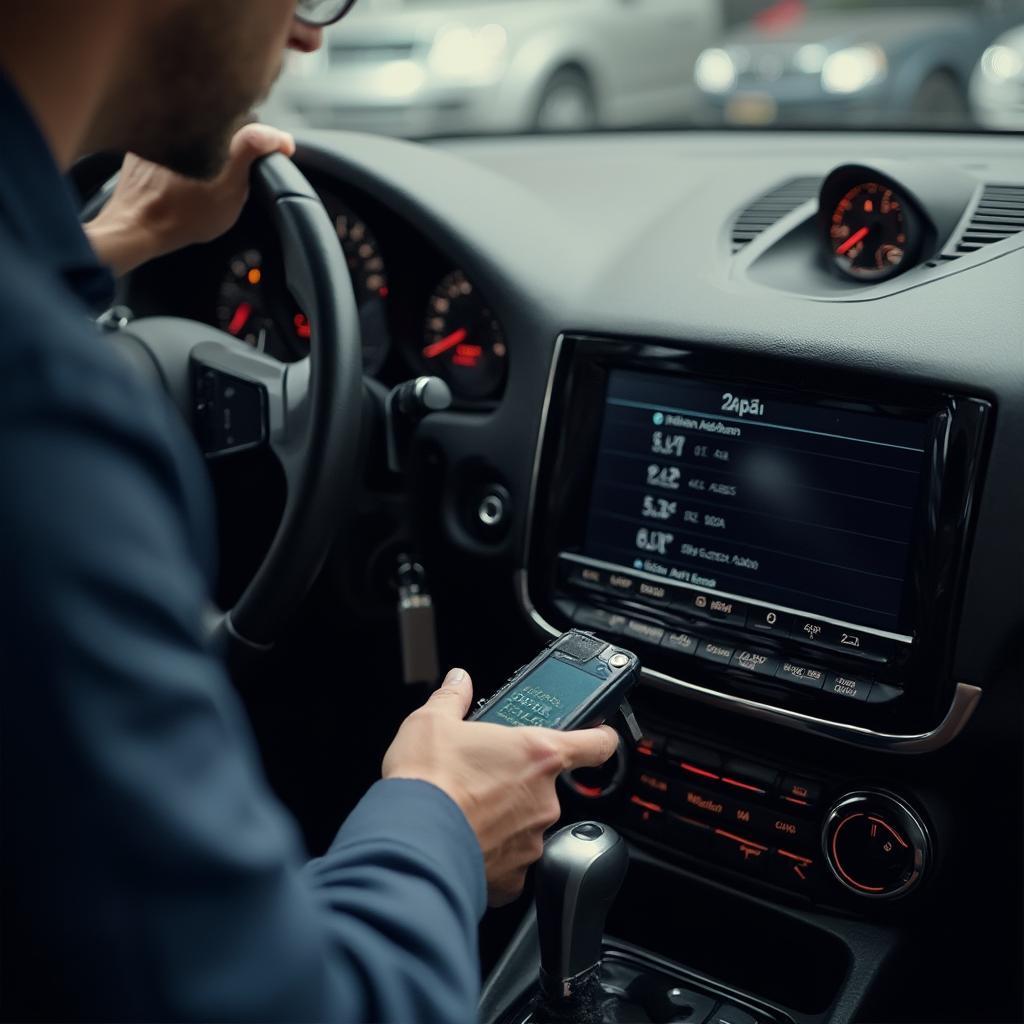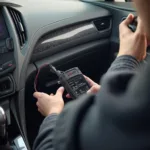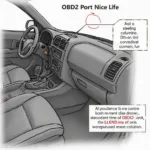The Porsche Cayenne, a luxurious SUV known for its performance and versatility, utilizes an AdBlue system to control emissions and meet stringent environmental regulations. An OBD2 scanner compatible with your Porsche Cayenne can be an invaluable tool for understanding and managing this system. This article will guide you through the essentials of Porsche Cayenne OBD2 scanners, specifically focusing on their role in monitoring and diagnosing AdBlue-related issues.
Understanding AdBlue and Your Porsche Cayenne
AdBlue, also known as Diesel Exhaust Fluid (DEF), is a non-toxic solution injected into the exhaust system of diesel engines like certain Porsche Cayenne models. It breaks down harmful nitrogen oxides (NOx) into harmless nitrogen and water vapor, reducing emissions and promoting cleaner air. The AdBlue system operates in tandem with your Cayenne’s engine control unit (ECU) to ensure optimal performance and compliance with emissions standards.
Why Use a Porsche Cayenne OBD2 Scanner for AdBlue?
While your Cayenne’s dashboard might display warning lights related to AdBlue, a compatible OBD2 scanner provides a more detailed and comprehensive understanding of the system’s status. Here’s why using a scanner is beneficial:
- Retrieve Specific Fault Codes: Unlike generic OBD2 scanners, a Porsche-specific one can read manufacturer-specific codes that pinpoint the exact AdBlue system issue.
- Access Live Data Stream: Monitor real-time AdBlue fluid levels, sensor readings, and system performance parameters to identify potential problems before they escalate.
- Perform Advanced Diagnostics: Some scanners allow you to run specialized tests on the AdBlue system, helping you diagnose complex issues that might not be immediately apparent.
- Reset Warning Lights: After addressing an AdBlue issue, you can use the scanner to clear the related warning lights on your dashboard.
Choosing the Right Porsche Cayenne OBD2 Scanner for AdBlue
Not all OBD2 scanners are created equal, especially when it comes to brand-specific diagnostics. When selecting a scanner for your Porsche Cayenne’s AdBlue system, consider these factors:
- Compatibility: Ensure the scanner explicitly states compatibility with Porsche vehicles, specifically the Cayenne model and year of manufacture.
- AdBlue Functionality: Verify that the scanner can read AdBlue-related fault codes, access live data streams for AdBlue parameters, and potentially perform specialized tests.
- Ease of Use: Look for a scanner with a user-friendly interface, clear instructions, and ideally, multilingual support.
- Additional Features: Some scanners offer extra functionalities like reading and clearing other system codes, resetting service reminders, and displaying battery voltage.
- Budget: OBD2 scanners range in price, so determine your budget and prioritize features that align with your needs.
Common Porsche Cayenne AdBlue Issues Detectable with a Scanner
An OBD2 scanner can help you diagnose a range of AdBlue-related problems in your Porsche Cayenne, including:
- Low AdBlue Fluid Level: The scanner will display the fluid level, allowing you to address the issue before it triggers a warning light.
- Faulty NOx Sensor: A malfunctioning NOx sensor can disrupt the AdBlue injection process, leading to increased emissions and potential engine performance issues.
- AdBlue System Leaks: The scanner can help pinpoint leaks in the AdBlue tank, lines, or injector, preventing fluid loss and potential damage to the exhaust system.
- AdBlue Pump Failure: A failing AdBlue pump can hinder the delivery of fluid to the exhaust system, compromising emissions control.
Conclusion
Investing in a quality Porsche Cayenne OBD2 scanner with AdBlue capabilities empowers you to take control of your vehicle’s emissions system. By understanding and monitoring the AdBlue system, you can ensure optimal performance, comply with environmental regulations, and potentially avoid costly repairs. Remember, always consult your owner’s manual or a qualified Porsche technician for guidance and support.


